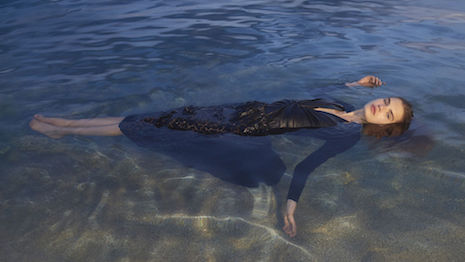- About
- Subscribe Now
- New York,
July 23, 2018

 Luxury brands need to be prepared to combat climate change. Image credit: Stella McCartney
Luxury brands need to be prepared to combat climate change. Image credit: Stella McCartney
Luxury companies need to address environmental challenges as climate change and technological advancements impact the industry, according to a new report by the Business for Social Responsibility (BSR) and members of its Responsible Luxury Initiative.
A diverse group of luxury brands are part of the initiative, including luxury conglomerate Kering, the Peninsula Hotel, Cartier, Chanel and PVH Corp. The report makes recommendations for luxury brands to fortify themselves in a changing world and contribute to a sustainable future.
“BSR’s Responsible Luxury Initiative is a great example of a platform that supports the development of collaborative solutions for sustainability issues,” said Marie-Claire Daveu, chief sustainability officer and head of international institutional affairs at Kering, Paris. “I think it was an organic evolution for companies in the luxury sector to come together to develop a report on these critical topics specific to luxury because the time had come to do so.”
Luxury opportunities
While the luxury sector expects growth in the coming years, it is not immune to disruptive global trends.
The report, titled "Disrupting Luxury: Creating Resilient Businesses in Times of Rapid Change," identifies three major disruptions impacting the business world, focusing on the luxury perspective.
Climate change is having negative effects on the quality and availability of a number of raw materials, and the associated combative measures could also impact the luxury sector. To assure their own futures, brands must play a part in reducing emissions and combating climate change, building it into their long-term strategy (see story).
Artificial intelligence is an exciting sphere for luxury brands to explore, but may lead to job losses as more production processes become automated.
Luxury retailers rely on raw materials like cotton to create their goods. Image credit: Prada
Growing economic inequality may also change the perception of what it means to be a modern luxury brand and determine whether or how luxury can be made more inclusive.
"Despite the big disruptions all business, including luxury companies, are facing, there are real opportunities to fuel future growth, drive innovation, and strengthen brand equity, if the industry builds on its strength," said Elisa Niemtzow, managing director at BSR, Paris.
The report identifies sustainable suggestions for luxury brands to brace themselves against these disruptions.
According to the Responsible Luxury Initiative, companies should protect resources by using less and recycling more, using business strategies and philanthropic efforts to positively benefit society and being transparent about their progress to engage more investors and consumers.
Luxury brands, particularly in fashion, are encouraged to invest in the protection and restoration of crucial ecosystems. This will help keep raw materials, such as wool, leather and cotton, available for those same luxury retailers.
High-end brands can also use their influence to promote the development of more innovative and sustainable materials.
Reselling luxury goods extends product's lifecycles and reduces waste. Image credit: Rent the Runway
Using recycled or upcycled materials, such as fashioning a tote bag out of leather scraps, also extends product lifecycles and reduces waste. "Recommerce” models, such as Rent the Runway and The RealReal, also increase the lifetimes of luxury goods.
The fashion market category that relies on consigning high-end apparel and accessories is witnessing a period of enormous growth, outpacing the full-price segment of its industry by 20 percent, according to a report from Fung Global Retail & Technology. The entire resale industry is expected to grow from $18 billion in 2016 to $33 billion by 2021 (see story).
Luxury companies should also evaluate how their products and services are impacting society and the environment. By articulating their values to stakeholders, companies will build trust and goodwill.
Sustainability efforts
Consumers are becoming more aware of sustainability issues, and are expecting more transparency and initiatives from luxury brands.
In particular, millennials expect brands to be more value-conscious. The five most important values to millennials are honesty, reliability, helping family, compassion and commitment (see story).
These values can be reflected in brands' sustainability efforts.
Recently, The Peninsula Hotels and Marriott International have both announced bans on disposable plastic straws, as well as curtailing use of single-use plastics.
There has been a growing campaign around curtailing the use of plastic straws, which are used and disposed of quickly and in large numbers, contributing to the significant amount of plastic waste in the oceans today.
Straws have been targeted because they are a relatively easy thing to give up yet they have a significant impact on a large scale (see story).
Kering is one of the biggest proponents of sustainability and reducing emissions in the luxury world. Through its large stable of brands, Kering has made it clear that sustainability at all levels is a priority.
Kering Eyewear, which makes the frames for brands such as Gucci, Bottega Veneta and Saint Laurent, has begun using new materials to make products more sustainable to produce. Kering is working with Bio-on to create a new type of plastic that, when it is no longer needed, can be safely and responsibly discarded with minimal impact on the environment (see story).
"As one company alone there is only so much influence we have to change the status quo," Kering's Ms. Daveu said. "The unique collaborative spirit in the luxury sector that has been created to develop this new report has been very rewarding, as it's through collective effort that we will enable real positive change in our sector."
Strong partnerships between brands will be crucial to creating positive changes.
"While competition among luxury brands in the commercial space is alive and well, there is a lot of collaboration on environmental and social issues," Ms. Niemtzow said. "Today, leading luxury brands are already implementing key sustainability frameworks such as the Paris Agreement on climate change or the Women’s Empowerment Principles."
Share your thoughts. Click here